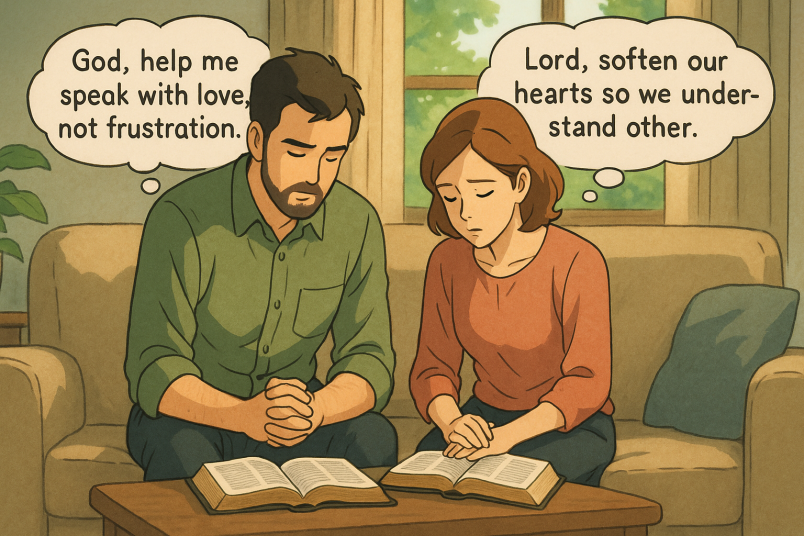11 Christian Marriage Counseling Tips for Stronger Love

Heal & Grow Daily for a Happier Relationship
Subscribe FREEKey Takeaways
Marriage.com AI Quick Summary
Marriage isn’t always easy, even when it’s built on faith. Some days feel light, joyful—like everything’s in harmony.
But other days?
They come with silence, misunderstandings, or just… distance. And that’s okay. Every couple, no matter how devoted, walks through seasons that test their patience, connection, and trust.
Sometimes, it’s not about fixing what’s broken—it’s about gently nurturing what’s already sacred. A small shift in perspective, a shared prayer, or a pause to truly listen can bring hearts closer than before.
For those moments when love feels strained or too quiet, Christian marriage counseling tips grounded in grace, patience, and faith can offer surprising warmth. After all, strong love doesn’t just happen—it’s chosen, day by day.
What is Christian marriage counseling?
Christian marriage counseling is a faith-centered approach to helping couples grow, heal, and reconnect together and with God. It blends the wisdom of Biblical teachings with practical tools for communication, trust, and emotional intimacy.
You won’t find judgment here; just gentle guidance, prayerful reflection, and space to be honest. Whether you’re navigating a rough patch or simply feeling distant, this kind of counseling invites grace into the conversation.
In fact, research shows that couples who share spiritual practices—like prayer and faith-based counseling—report higher relationship satisfaction and emotional closeness.
It reminds us that love, when rooted in faith, can still deepen… one step, one prayer, one open heart at a time.
11 Christian marriage counseling tips for stronger love
Every marriage needs care, faith, and effort. Whether you’re newly married or walking through years of togetherness, some gentle reminders can go a long way.
These Christian marriage counseling tips are rooted in love, scripture, and emotional connection. They’re not about perfection, but about intention, grace, and holding on to what truly matters.
1. Respect for each other
For a married couple, it is necessary that they show mutual respect. Marriage is a success when both individuals put in an equal amount of time and effort to make things work.
Being married is not easy. There are multiple responsibilities and things one must accommodate in daily life. But the moment you begin respecting each other, a sense of shared responsibility grows, and you’ll start to notice the difference.
Here’s why it is important:
- Respect builds emotional safety and reduces resentment.
- It reminds both partners that their efforts are valued.
- Mutual respect helps nurture lasting love through life’s ups and downs.
- How can you practice it?
Respect shows up in the little things—letting your spouse finish a thought, thanking them for what they do, or simply listening without interrupting.
Try saying, “I see how hard you’ve been working lately. Thank you for doing all of this for us.” Or, when you disagree, pause and respond, “I don’t see it the same way, but I understand where you’re coming from.”
These moments may seem small, but they echo deeply in a loving marriage.
2. Speak up
Even when you go out for Christian marriage counseling, they often recommend one essential solution: speak up.
We sometimes take things for granted and assume the other person must have understood. But in reality, they may not have. To avoid confusion or emotional distance, be honest about the issues you’re facing and the difficulties you feel.
This helps your partner understand your perspective and be there for you when you need it most.
Here’s why it is important:
- Silence can lead to unresolved hurt and disconnection.
- Speaking up builds trust and encourages mutual support.
- It keeps assumptions from damaging your bond.
- How can you practice it?
Start small. If something is bothering you, bring it up gently—without waiting for the “perfect time.” Say, “Can we talk about something that’s been on my heart? It’s not huge, but it matters to me.” This soft opening helps prevent defensiveness.
Use “I” statements like, “I felt a little hurt yesterday when…” rather than “You never…” Avoid blame; aim for clarity. And if emotions are high, agree to pause and return later with grace.
3. Agree to disagree
You don’t always have to say the “right” thing or have an opinion on everything.
Sometimes, you just have to agree to disagree. For example, if he believes the black shirt makes him look smart, you might not agree. Sharing that disagreement out loud may not serve any real purpose—it might even cause tension.
So instead of pressing the point, sometimes it’s okay to stay quiet and let things be. After all, their happiness matters too, right?
Here’s why it is important:
- It helps avoid unnecessary arguments.
- Respecting differences strengthens emotional maturity.
- Choosing peace over “being right” shows deep love.
- How can you practice it?
When you’re tempted to correct a minor disagreement, pause and ask yourself, “Does this really matter in the long run?”
If it doesn’t, let it go with a smile. You might say, “Well, you love that shirt and that’s what matters!” Or if it’s a deeper issue, you can say, “I don’t see it that way, but I respect your opinion.”
Learning when to speak and when to stay silent takes wisdom—and it’s one of those Christian marriage counseling tips that gets easier with practice.
4. Walk to the Lord together
One common piece of Christian marriage counseling tips is to pray or attend church together. Spending quality time with the Lord brings peace and connection.
When you do things as a couple—especially things rooted in faith—you often rediscover joy in your relationship.
Here’s why it is important:
- Shared spiritual time deepens your bond with God and each other.
- It aligns your values as a couple.
- It strengthens hope, especially during difficult times.
- How can you practice it?
Set aside a quiet moment each day—even just five minutes—to pray together or read a devotional. Light a candle and say, “Let’s pray before dinner, just the two of us.”
Attend a church service hand-in-hand or choose a scripture each week to reflect on. Say things like, “What did that passage mean to you?” These shared rituals help center your relationship in faith and bring a spiritual calm to everyday life.
5. Address the issue
As a helpful Christian marriage counseling tip, the best way to handle challenges is to face them together.
There might be moments when you’re struggling in your marriage. Instead of ignoring the problem or brushing it aside, take the brave step of talking to your partner. Gently bring up what’s been bothering you, and work together to find a solution.
Here’s why it is important:
- Avoiding problems only delays healing.
- Open dialogue helps prevent emotional distance.
- It teaches teamwork in the face of hardship.
- How can you practice it?
If something feels “off,” don’t wait for a big blow-up. Sit down and say, “Can we talk about something I’ve been holding in? I want us to work through it together.”
Make space for your spouse to share their side too, without interruption. Listen fully, then respond with grace: “I didn’t know you felt that way, but I’m really glad you told me.” Facing issues early shows maturity and love.
6. Don’t call your spouse degrading names
In today’s fast-paced world, we sometimes speak before thinking—and regret it afterward.
But degrading or hurtful words can leave lasting emotional wounds. They may put your spouse in an awkward, painful place, even if you didn’t mean to hurt them.
So choose your words with care. Speak with love, even when you’re upset.
Here’s why it is important:
- Kind words nurture emotional security.
- It helps prevent long-term damage to your connection.
- It reflects Christ-like communication in your marriage.
- How can you practice it?
When tempers rise, pause and breathe. Say, “I’m feeling overwhelmed—can we take a break and talk in a few minutes?” Later, return with humility: “I was upset earlier, but I never want to speak in a way that hurts you.”
Replace criticism with curiosity. Instead of “You always mess things up,” try, “Can we figure out how to do this better together?” Words can either wound or heal—choose them like a prayer.
7. Encourage your spouse
Everyone needs encouragement or a gentle push from time to time. They may be seeking support to try something new, take a risk, or believe in themselves again.
If you get the chance, step in and cheer them on. Offer words of faith, praise, or even silent presence. Your encouragement can mean more than you know.
Here’s why it is important:
- Encouragement strengthens emotional intimacy.
- It helps your spouse feel seen and supported.
- You become each other’s biggest source of strength.
- How can you practice it?
Offer a compliment without needing a reason: “I love how focused you are on your goals.” Celebrate their small wins: “You did so well handling that call—I’m proud of you.”
And when they’re discouraged, be their quiet strength: “Even if you doubt yourself, I believe in you. You’ve got this.” These everyday words remind them they’re not walking alone.
8. You need help
The first step toward Christian marriage counseling is to acknowledge that you need help. Those who ask for help are the ones most likely to find it.
If you believe everything is fine—despite knowing deep down that things aren’t—it’s difficult for anyone to help. So be honest with yourself. Admitting you need guidance is not weakness; it’s strength rooted in faith.
Here’s why it is important:
- Denial keeps healing out of reach.
- Admitting need opens the door to spiritual and emotional growth.
- It aligns with biblical marriage tips rooted in humility.
- How can you practice it?
Have a simple, open-hearted conversation like, “I think we could use some outside help—it’s not because we’ve failed, it’s because we care.”
Look into counseling together, and set a tone of unity: “Let’s do this hand-in-hand.” Read books, listen to Christian podcasts, or attend a couples’ retreat. The more you normalize seeking help, the more healing becomes possible.
9. Your spouse is not your enemy
Marriage can be challenging. There will be times when you feel pressure or frustration, but you still have to work through it.
No matter what, Christian marriage counseling tips never encourage seeing your spouse as your enemy. Instead, view them as your partner, your support system—someone walking through the fire with you, not against you.
The day you embrace that truth, things begin to shift.
Here’s why it is important:
- Seeing your spouse as a teammate fosters unity.
- It builds a strong foundation of grace and loyalty.
- You begin to fight problems, not each other.
- How can you practice it?
When conflict arises, remind each other out loud: “We’re on the same team.” Reframe the moment by saying, “This isn’t me vs. you—it’s us vs. the problem.”
Even after a tough disagreement, come back with, “I still love you. We’re in this together.” That mindset shift is often all it takes to restore peace.
10. Nothing can beat honesty
Being honest is one of the hardest, yet most beautiful, things to do. The Bible teaches us to walk in truth, especially with those we love.
So be honest with your spouse about your feelings, fears, and hopes.
Don’t hide things or walk in secrecy. And if you’re struggling with thoughts that feel heavy or hard to admit, consider reaching out for Christian marriage counseling before they grow deeper.
Here’s why it is important:
- Honesty protects your emotional connection.
- It builds trust and spiritual transparency.
- It creates space for healing, not hiding.
- How can you practice it?
Make it a habit to check in emotionally. Say, “Is it okay if I share what’s been on my heart?” Create a safe space by responding with compassion: “Thank you for being real with me—I appreciate your honesty.”
Don’t punish honesty; reward it with gentleness. The more you tell the truth in love, the more your relationship will thrive.
11. Make a habit of listening to each other
One of the secrets to a strong marriage is simply listening. Pay attention when your spouse shares something, no matter how small. Sometimes, just feeling heard can calm anxiety or resolve conflict before it escalates.
Studies have shown that attentive listening during the expression of stress by a partner is linked to better coping behaviors and higher relationship satisfaction in 365 couples, suggesting that context-specific active listening may be a valuable focus for improving support and connection in couple therapy and education programs.
If you’re considering counseling, it’s okay to have doubts. Bring your questions to a trusted expert. Asking for help is not a failure—it’s a step toward healing.
Here’s why it is important:
- Listening shows respect and care.
- It helps prevent emotional misunderstandings.
- Good listening is one of the most overlooked Christian marriage tips and advice.
- How can you practice it?
Put your phone down. Make eye contact. Nod. Repeat back what you hear: “So what I’m hearing is that you felt unsupported today?” Let them know you’re fully present.
Even if you don’t agree, say, “I understand why that mattered to you.” Listening is a love language—and one of the quiet ways God moves between hearts.
How can Christian counseling improve your relationship in the long term?
Christian counseling isn’t just for when things fall apart—it’s also for when love needs tending. Over time, even the strongest marriages can feel stretched thin… by stress, silence, or just the busyness of life. That’s where faith-based support steps in gently.
With grace, scripture, and practical tools, Christian counseling helps couples reconnect—not just as partners, but as spiritual companions. You learn how to speak with kindness, forgive like Christ, and love with deeper intention. It’s not about being perfect—it’s about staying close, even in the hard seasons.
Long-term benefits of Christian counseling include:
- Strengthens emotional and spiritual intimacy
- Builds tools for healthy conflict resolution
- Promotes shared purpose rooted in faith
- Encourages personal and mutual growth
Because love rooted in God doesn’t fade easily—it deepens, refines, and holds steady. And with the right support, your marriage can become not just stronger… but sacred.
Is Christian counseling right for every couple?
The short answer
Not always—but often, yes. Every couple is different, with unique dynamics, needs, and spiritual rhythms. While Christian counseling can offer powerful support rooted in faith, grace, and practical wisdom, it’s not a one-size-fits-all solution.
That said, if both partners are open to growing together and with God, it can be a deeply healing journey.
1. It works best when both partners are open
For counseling to truly help, both people need to show up—emotionally, spiritually, and honestly. If one partner is resistant or completely closed off, progress can feel slow or stuck.
Christian counseling thrives on shared faith and humility. When couples walk in with open hearts, even just a little, the process becomes more meaningful. It’s not about instant change but a willing spirit and God meeting you there.
- Bonus point: Try saying to your partner, “Would you be open to exploring this together, even if we’re unsure? We don’t have to have it all figured out—just be willing.”
2. It’s not just for “broken” marriages
There’s a common myth that counseling is only for couples in crisis, but that couldn’t be further from the truth! Many healthy marriages benefit from having a safe space to grow, reflect, and realign.
Christian counseling offers guidance even in seasons of peace, helping couples deepen communication, intimacy, and shared purpose. Think of it as regular care for the soul of your relationship, not just damage control.
- Bonus point: Don’t wait for something to “go wrong.” Book a session during a good season and say, “Let’s do this as a way to invest in us, while things are still going well.”
3. Some couples may prefer a different approach
Not every couple shares the same spiritual beliefs, and that’s okay. If one spouse doesn’t feel connected to Christian principles, they may find faith-based counseling difficult to engage with.
In these cases, a neutral or blended approach might feel more inclusive. What matters most is finding a path that helps both partners feel seen, respected, and supported—whether that includes prayer and scripture or not.
- Bonus point: If your spouse is unsure, say, “Let’s talk to a counselor first and see if they offer a balance of faith and practical help—no pressure, just a first step.”
4. It requires emotional honesty and vulnerability
Christian counseling encourages couples to open their hearts—not just to each other, but to God. That level of honesty can be intimidating, especially if one or both partners tend to avoid emotions.
But growth doesn’t come without a little discomfort. If you’re willing to name the hard stuff with courage and care, Christian counseling becomes a space of grace and transformation, not shame.
- Bonus point: Start by naming one feeling out loud: “I don’t always know how to express this, but I want us to grow.” Vulnerability often begins with one honest sentence.
Watch this video in which Dr. Maika Steinborn explains vulnerability & how to be vulnerable with your partner:
5. It offers more than just solutions—it offers spiritual renewal
Unlike standard talk therapy, Christian marriage counseling weaves faith into every conversation. It’s not just about fixing habits or resolving conflicts—it’s about reconnecting with God’s design for your marriage.
Over time, this leads to a deeper sense of purpose, patience, and peace. Couples often leave not just more connected, but more rooted in something eternal.
And that’s the beauty of it.
- Bonus point: Bring scripture into your sessions or conversations. Try saying, “Let’s pray before our next talk, even if it’s a little awkward—I think it could help.”
Love rooted in faith
Marriage isn’t about having it all figured out—it’s about choosing each other, over and over, even on the hard days. Love deepens when it’s nurtured with faith, kindness, and a little help along the way.
Whether you’re walking through a storm or simply hoping to grow closer, small changes can make a lasting difference. These Christian marriage counseling tips aren’t about perfection; they’re about grace, intention, and staying rooted in love.
So breathe, pray, and keep showing up for each other… one gentle moment at a time. With God at the center, stronger love isn’t just possible—it’s promised.
 Tips
Tips
Write your tip or submit a video tip
All tips are reviewed before the publishing.
Share this article on
Recent Articles
Related Quizzes
Heal & Grow Daily for a Happier, Healthier Relationship
Subscribe FREE on YouTube We'd love your feedback!
We'd love your feedback!
 Expert Q&A
Expert Q&A
Ask your question related to this topic & get the support you deserve from experts.


 Reviewed by
Reviewed by
















 Thanks for your feedback!
Thanks for your feedback!